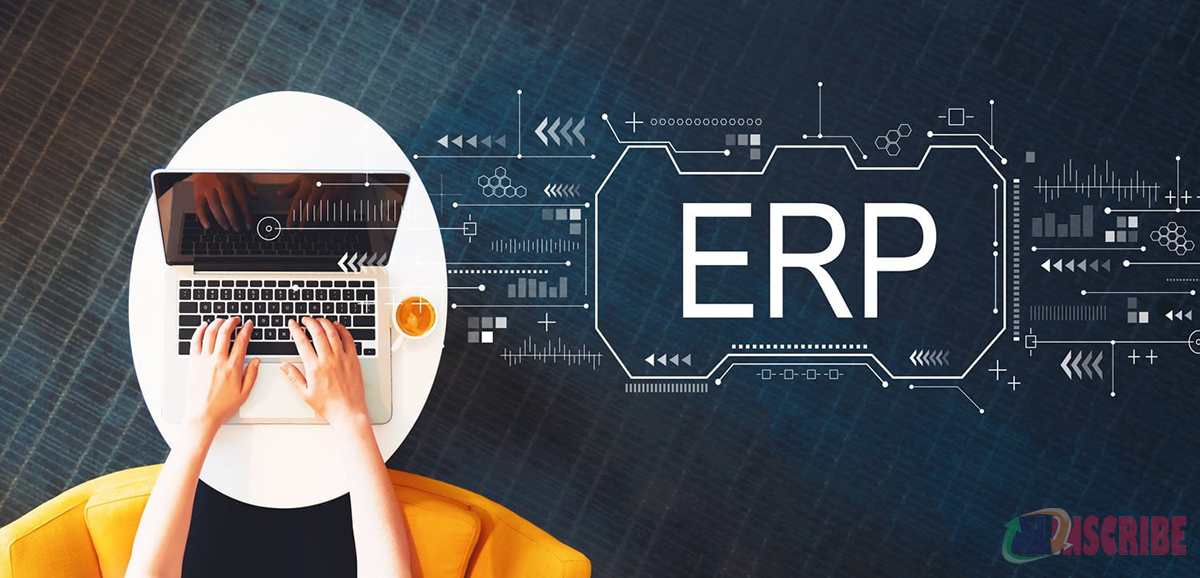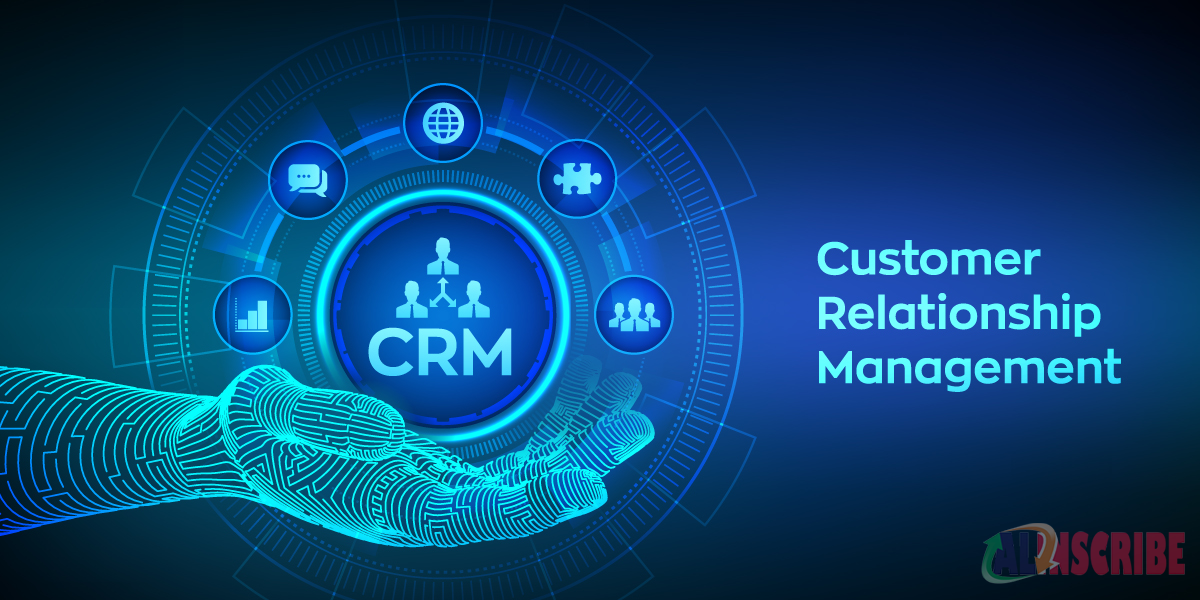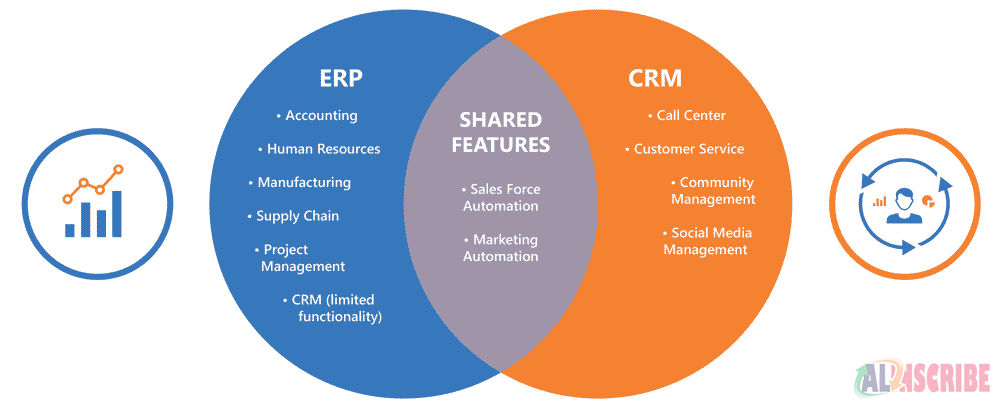10 Proven Benefits Of ERP And CRM Solutions

An ERP (Enterprise Resource Planning) system is a type of software that organizations use to manage their day-to-day activities. It integrates various core business processes, such as finance, human resources, supply chain, manufacturing, procurement, and more, into a single, unified system. The goal of an ERP system is to streamline operations and improve efficiency by providing a centralized and real-time view of data across different departments.
CRM stands for Customer Relationship Management, and a CRM system refers to a technology solution designed to help businesses manage and analyze interactions with their current and potential customers. The primary goal of a CRM system is to improve and optimize customer relationships, ultimately leading to increased customer satisfaction, loyalty, and business growth.
Implementation of an ERP system is mostly a key element to bring success to a company’s plate. 88% of the companies consider the fact that implementing ERP systems have helped them in succeeding. However, 53% of the companies face issues in ERP implementation as well.
Similarly, 91% of the global companies with 10 or more employees use CRM as the primary tool of managing customers. On the other hand, 63% of the businesses face failure during CRM system implementation.
The primary reason behind these failure are the lack of knowledge regarding the proper usage of ERP CRM solutions. Knowing the techniques to put ERP CRM solutions into work is crucial to extract as many benefits as possible. In this article, we are going to discuss 10 proven benefits of ERP CRM solutions along with other important information related to the topic. Hence, keep reading the article to gain some valuable insights.

What are the areas to be benefited by ERP CRM solutions
Understanding Market Dynamics
Enterprise Resource Planning (ERP) systems play a pivotal role in helping businesses gauge market elasticity. By offering a comprehensive view of customer needs, ERP assists in tasks ranging from lead generation to invoice creation. Furthermore, ERP systems leverage historical data analysis to identify market trends, understand consumer behavior, and adapt to changing market conditions. This holistic approach empowers businesses to stay agile and responsive in dynamic market environments.
Automated Stock Management
The inventory management module within ERP systems brings about a paradigm shift in the procurement process. Its transformative capabilities minimize delays and disruptions in production activities. ERP supports automated stock replenishment through methods such as Replenishment Automation and Lot-for-Lot Replenishment. The former ensures that inventory is automatically replenished when stock levels reach predefined thresholds, while the latter triggers replenishment each time existing stock is sold in the market. These features enhance inventory control, reducing the likelihood of stockouts and overstock situations.
Streamlining Financial Reporting
Another significant benefit of ERP lies in streamlining financial reporting processes. ERP automates the intricate task of generating financial reports, including but not limited to the Balance Sheet and Income Statement. Businesses stand to gain from the automation of cash flow projections, management of accounts receivables, and accounts payables. Accounts Payable (AP) Automation streamlines vendor invoice generation, while Accounts Receivable (AR) Automation facilitates efficient management and automated delivery of invoices. These automated financial reports not only provide deep insights into the financial position of the company but also eliminate human errors, enhancing audit-friendliness.
Enabling Global Business Operations
Businesses operating on a global scale benefit immensely from ERP's suite of risk and compliance management tools. ERP facilitates seamless tax compliance, financial report generation, audit trails, sustainability practices, end-to-end traceability, and value creation. The multi-language, multi-country, and multi-currency capabilities of ERP simplify complex global operations, providing a unified platform for diverse business needs.
Realizing Cost Savings
ERP software, tailored to the Indian business landscape, introduces automation that reduces the time and effort required for day-to-day business tasks. This not only enhances accuracy but also leads to substantial reductions in operational and overhead costs. Minimizing manual data entry allows employees to redirect their efforts toward value-added tasks, thereby increasing overall profitability and helping achieve strategic business objectives.
Elevating Customer Support
Among the myriad benefits of ERP, its ability to enhance customer support stands out prominently. ERP systems create a comprehensive repository of customer data, offering a holistic view that includes contact information, order history, warranty details, and any previous complaints. This wealth of information enables businesses to identify cross-selling opportunities and make customer-centric decisions, ultimately leading to improved customer satisfaction and loyalty.
Ensuring Quality Standards
Manufacturing deficiencies can incur significant costs for businesses, including returns, replacements, and warranty repairs. ERP addresses these challenges by streamlining and transforming the manufacturing process, incorporating mechanisms for early defect identification. This not only enhances product quality but also contributes to cost savings by reducing rework and warranty-related expenses.
Harnessing Powerful Forecasting Tools
Business Management Software, including ERP, provides powerful tools for planning, forecasting, and predictive analysis. ERP empowers businesses to make informed analyses and data-backed assumptions about future occurrences, ensuring high accuracy and time savings. Examples include estimating sales, predicting customer demands, assessing stock availability, anticipating equipment failure, and minimizing downtimes. These forecasting capabilities position businesses to proactively manage resources and respond effectively to market dynamics.
Optimizing Cash Flow
Maintaining a healthy cash flow is indispensable for meeting everyday expenditures and sustaining business operations. ERP not only provides insights into the company's cash flows but also actively contributes to maintaining a robust cash flow. By offering real-time visibility into financial transactions and automating financial processes, ERP empowers businesses to make informed decisions that positively impact cash flow management.
Sales and Lead Management
CRM systems streamline the sales pipeline, automating tasks such as lead assignment, follow-ups, and opportunity tracking. This leads to more efficient sales processes and increased conversion rates.
Marketing Effectiveness
By analyzing customer data, CRM systems facilitate targeted marketing campaigns. Businesses can segment their audience based on demographics, behavior, and preferences, leading to more effective and personalized marketing strategies.
Customer Service and Support
CRM systems centralize customer support information, making it easier to track and resolve issues. This leads to faster response times, improved customer satisfaction, and a more efficient support team.

Data-Driven Decision-Making
CRM systems provide valuable insights through analytics and reporting tools. Businesses can analyze customer behavior, sales performance, and other key metrics, enabling data-driven decision-making for strategic planning.
Collaboration and Communication
CRM systems enhance internal communication by providing a centralized platform for sharing customer information. This improves collaboration between sales, marketing, and customer service teams, leading to a more cohesive and customer-focused approach.
Workflow Automation
CRM systems automate routine tasks, reducing manual efforts and minimizing the risk of errors. This leads to increased efficiency, allowing employees to focus on high-value tasks.
Customer Retention
CRM systems help businesses identify cross-selling and upselling opportunities by analyzing customer data. This contributes to increased revenue and enhanced customer loyalty.
Lead Generation
CRM systems facilitate effective lead nurturing through personalized communication. Businesses can track leads through the sales funnel, ensuring timely and relevant engagement.
Inventory and Order Management
In some cases, CRM systems integrate with inventory and order management systems, streamlining processes and reducing delays in order fulfillment.
Forecasting and Planning
CRM systems provide tools for forecasting and planning. Businesses can make more accurate predictions regarding sales trends, customer demands, and market fluctuations.
Customer Feedback and Satisfaction
CRM systems allow businesses to collect and analyze customer feedback. This helps in understanding customer satisfaction levels, addressing concerns, and continuously improving products and services.
Compliance and Security
CRM systems often come with security features to protect sensitive customer data. This is crucial for compliance with data protection regulations and building trust with customers.
Scalability
CRM systems are designed to be scalable, accommodating the growth of the business. Whether the customer base expands, or new functionalities are needed, CRM systems can adapt to evolving business requirements.
In conclusion, the multifaceted benefits of ERP systems extend across various facets of business operations, from market analysis and inventory management to financial reporting, global operations, cost savings, customer support, quality assurance, forecasting, and cash flow optimization. While the implementation of CRM systems can have a transformative impact on various aspects of business, fostering stronger customer relationships, improving operational efficiency, and contributing to overall business success. Adopting ERP is not merely a technological upgrade; it's a strategic investment that propels businesses toward efficiency, agility, and sustained growth in a competitive landscape.
10 proven benefits of implementing ERP CRM solutions
1. Seamless Data Integration
One of the primary advantages of ERP CRM solutions is the seamless integration of data across various departments. By combining ERP and CRM functionalities, businesses create a unified platform where information flows seamlessly from sales and marketing to finance, manufacturing, and customer service. This integration eliminates data silos, ensuring that all teams have access to real-time, consistent, and comprehensive data.
2. Holistic Customer Insights
The integration of CRM with ERP allows for a holistic view of customer interactions and transactions. This means that sales, marketing, and customer service teams have access to a unified customer database containing details such as purchase history, preferences, and support interactions. With this 360-degree view, businesses can tailor their strategies, anticipate customer needs, and deliver personalized experiences, ultimately enhancing customer satisfaction and loyalty.
3. Improved Customer Engagement
ERP CRM solutions enable businesses to streamline and automate customer interactions. From lead generation and sales processes to post-sales support, a cohesive system ensures that every touchpoint with the customer is optimized. Automated workflows, personalized marketing campaigns, and timely follow-ups contribute to improved customer engagement, fostering stronger relationships and increasing the likelihood of repeat business.
4. Enhanced Sales Performance
The synergy between ERP and CRM brings about a significant improvement in sales performance. Sales teams benefit from streamlined processes, automated lead nurturing, and accurate forecasting. CRM tools integrated with ERP data provide insights into customer behaviors and preferences, empowering sales teams to make informed decisions, prioritize leads, and close deals more efficiently.
5. Operational Efficiency and Cost Savings
ERP CRM solutions lead to enhanced operational efficiency by automating routine tasks and eliminating redundant processes. With integrated systems, there is a reduction in manual data entry, minimizing the risk of errors. This not only boosts productivity but also results in substantial cost savings. Employees can focus on value-added tasks, and the organization benefits from streamlined operations with reduced overheads.

6. Real-time Analytics and Reporting
The combination of ERP and CRM provides robust analytics and reporting capabilities. Businesses can generate real-time reports that offer insights into various aspects, including sales performance, customer behaviors, inventory levels, and financial metrics. These data-driven insights empower organizations to make informed decisions, adapt quickly to market changes, and strategize effectively for future growth.
7. Streamlined Supply Chain Management
Integrating ERP CRM solutions extends the benefits to supply chain management. From procurement to production and distribution, businesses can optimize their supply chain processes. ERP functionality ensures efficient resource planning, inventory management, and order fulfillment. This streamlined approach results in a more responsive supply chain, reduced lead times, and improved overall operational agility.
8. Better Decision-Making with Predictive Analysis
ERP CRM solutions leverage predictive analysis tools that enable businesses to make better-informed decisions. By analyzing historical data and identifying patterns, organizations can anticipate future trends, customer demands, and market fluctuations. This foresight is invaluable for strategic planning, helping businesses stay ahead of the competition and make proactive decisions that align with their long-term objectives.
9. Compliance and Risk Management
Integrated ERP CRM solutions contribute to improved compliance and risk management. These systems often come equipped with features to ensure regulatory compliance in areas such as data protection, financial reporting, and industry-specific regulations. The combination of ERP and CRM functionalities also provides tools for risk assessment and mitigation, enhancing the organization's ability to navigate complex regulatory landscapes.
10. Scalability for Future Growth
ERP CRM solutions are designed to be scalable, making them well-suited for businesses with growth ambitions. As companies expand their operations, customer base, or product offerings, the integrated systems can adapt to evolving needs. This scalability ensures that organizations can continue to leverage the benefits of ERP CRM solutions, supporting their growth trajectory without the need for major system overhauls.
Conclusion
The integration of ERP CRM solutions delivers a holistic solution that extends benefits across the entire business ecosystem. From improved customer engagement and streamlined operations to data-driven decision-making and scalability, the synergy between ERP and CRM empowers organizations to thrive in a competitive landscape. Businesses that invest in integrated ERP CRM solutions position themselves for sustained growth, enhanced customer satisfaction, and a competitive edge in today's dynamic business environment.
Article Comments
Similar Articles
Articles Search
Sponsor
There are zero sub-categories in this parent category.
There are zero sub-categories in this parent category.
There are zero sub-categories in this parent category.
















